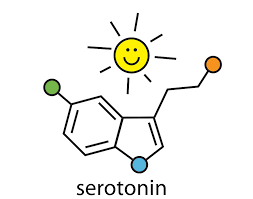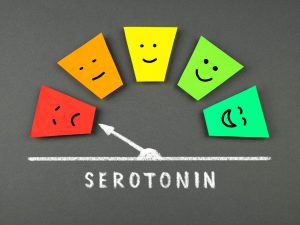Contents
What Is Serotonin?
 Serotonin is a neurotransmitter that is responsible for mood, appetite, sleep, and memory. It can be increased through exercise, good nutrition, and taking supplements. Serotonin is a hormone and neurotransmitter that is present in the brain, gastrointestinal tract, and blood platelets. Its primary role is regulating mood, but it also plays a part in controlling food intake, sleep, sexual function, and memory. A person can increase its levels through exercise, diet, and supplementation.
Serotonin is a neurotransmitter that is responsible for mood, appetite, sleep, and memory. It can be increased through exercise, good nutrition, and taking supplements. Serotonin is a hormone and neurotransmitter that is present in the brain, gastrointestinal tract, and blood platelets. Its primary role is regulating mood, but it also plays a part in controlling food intake, sleep, sexual function, and memory. A person can increase its levels through exercise, diet, and supplementation.
Its proper functioning is very necessary for emotional and physical well-being. Serotonin is responsible for mood, appetite, sleep, and memory. You can increase serotonin levels through exercise, good nutrition, and supplements.
Good nutrition is another way to increase serotonin levels. Foods that contain a high amount of tryptophan, such as bananas and dairy products, can help boost serotonin production in the brain. Bananas are especially good because they’re high in potassium and B vitamins – all of which contribute to healthy hormone function and stress relief.
Benefits Of Serotonin
 Serotonin has a number of benefits, including:
Serotonin has a number of benefits, including:
- Regulating mood
- Controlling food intake
- Regulating sleep
- Regulating sexual function
- Contributing to memory
- Lowering blood pressure
- Reducing cholesterol levels
Serotonin is a neurotransmitter that has several benefits. It helps to regulate mood, food intake, sleep, sexual function, memory, and stress hormones. These benefits can be achieved through exercise, good nutrition, and taking supplements.
Exercise can help increase serotonin levels by increasing the body’s production of endorphins which cause an overall sense of wellbeing. It can also help combat stress, lower blood pressure and cholesterol levels as well as improve sleep quality.
Foods that contain a high amount of tryptophan can help boost serotonin production in the brain. Bananas are especially good because they’re high in potassium and B vitamins – all of which contribute to healthy hormone function and stress relief.
How To Increase Serotonin Level?

There are many ways to increase serotonin levels. The key is to find what works best for you. That being said, there are some common guidelines that have been proven successful in the past. For instance, exercise has been shown to be a major player in increasing serotonin levels. It increases your body’s production of endorphins, which cause an overall sense of well-being and happiness (not just from exercise). Exercise also helps combat stress, lowers blood pressure and cholesterol levels, and improves sleep quality (which also contributes to higher serotonin levels).
Certain Foods
There are a number of foods that can help increase serotonin levels. Some of the best include bananas, dairy products, nuts, seeds, and dark chocolate.
- Bananas are a great food to help increase serotonin levels. They’re high in potassium and B vitamins, which contribute to healthy hormone function and stress relief. They’re also a good source of tryptophan – the amino acid that is converted into serotonin in the brain.
- Dairy products are another food that can help boost serotonin levels. They’re high in tryptophan and contain other nutrients that support their production, such as calcium and magnesium.
- Nuts and seeds are other good sources of nutrients that can help increase their levels. They’re high in tryptophan and essential fatty acids, which contribute to hormone balance.
- Dark chocolate is a sweet treat that can help increase your serotonin levels. It’s high in magnesium and contains small amounts of tryptophan – making it a perfect choice for anyone looking to improve their mood.
- Bananas, dairy products, nuts & seeds, and dark chocolate are all great foods that can help increase serotonin levels. They’re high in tryptophan and other nutrients that support serotonin production, such as magnesium and calcium.
Increase serotonin through exercise, good nutrition, and supplements.
Exercise is important for increasing serotonin levels. It increases your body’s production of endorphins, which cause
Exercises

Exercise is important for increasing serotonin levels. It increases your body’s production of endorphins, which cause an overall sense of well-being and happiness (not just from exercise). Exercise also helps combat stress, lowers blood pressure and cholesterol levels, and improves sleep quality (which also contributes to higher serotonin levels). There are a number of exercises that can help increase serotonin levels. Some of the best include walking, running, cycling, and yoga.
- Walking is a great exercise to help boost serotonin levels. It’s easy to do and can be done almost anywhere. It also helps to improve mood and reduce stress.
- Running is another great exercise that can help increase serotonin levels. It’s a great way to get your heart rate up and release endorphins. It also helps to improve mood and reduce stress.
- Cycling is another great exercise that can help increase serotonin levels. It’s a good way to get some cardiovascular exercise and it’s fun too! It also helps to improve mood and reduce stress.
- Yoga is another great exercise that can boost serotonin levels. It’s a form of strength-building exercise (which helps to increase your body’s production of endorphins), but it also helps to improve mood and reduce stress.
- Strength-building exercises are great for increasing serotonin levels because they increase your body’s production of endorphins, which cause the overall sense of wellbeing that you feel after exercising. Yoga is one good example because it combines strengthening with calming, meditative poses to reduce stress which increases serotonin production.
Exercise, good nutrition, and supplements all help to increase serotonin levels. All three are important if you want to reap the benefits of increased serotonin levels. Each one has its own benefits so try incorporating them into your lifestyle for optimal health.
Stress Relieving Techniques

Stress is one of the biggest factors in serotonin levels so it’s important to find ways to reduce stress when you can. Yoga, meditation, massages, and walks in nature are great ways to help reduce stress, which will in turn help increase serotonin levels.
- Yoga is a great way to reduce stress. It combines calming poses with strengthening exercises that can improve mood and boost serotonin production.
- Meditation is another good way to reduce your overall stress level by taking some time out of each day to relax and let go of daily worries.
- Massages are also another great way to relieve tension and feel more relaxed (this doesn’t have to be a full-body massage. Just a 5-minute head or foot rub will help you feel relaxed and relieve stress).
- Walks in nature are also another great way to reduce stress and improve mood. Spending time in nature has been shown to increase serotonin levels and overall wellbeing; it’s definitely something we could all do more often!
Reducing stress is important for increasing serotonin levels because, although serotonin is produced when you’re under pressure, too much stress can result in lower levels of the hormone (leading to negative effects such as low mood, anxiety, and sleep problems). It’s important to find ways to reduce your overall level of stress every day if possible through exercises like yoga or meditation or simple things like enjoying time outside or massages with loved ones.
Healthy Eating

There are certain foods that will help increase serotonin levels, such as protein and complex carbohydrates (foods like whole grains and fruit). There are also certain foods that can actually decrease serotonin levels, such as refined carbohydrates and sugars (foods like candy and white bread). Eating a healthy diet full of fresh fruits and vegetables is great for increasing serotonin production and overall wellbeing. Healthy diets high in protein and complex carbs help to speed up the production of serotonin while healthy diets low in refined carbs help to maintain optimal serotonin levels. Some examples of healthy meals include oatmeal with milk, berries, chia seeds & almonds; microwave brown rice bowl (microwave 1 cup brown rice, 1/2 cup black beans, salt/pepper to taste, and any veggies you like); spinach & pesto salad with chicken; roasted sweet potato with avocado.
Healthy diets full of complex carbs such as whole grains and fruits help increase serotonin levels by speeding up the brain’s production of the hormone.
Healthy diets low in refined carbohydrates such as candy and white bread help maintain optimal serotonin levels. A healthy, balanced diet high in protein is great for boosting overall wellbeing and increasing serotonin levels.
Supplements

There are certain vitamins and nutrients that can actually decrease your brain’s ability to produce serotonin. So it’s important to ensure you’re getting enough of those types of nutrients (and avoiding too much of those types of nutrients). For example, foods and supplements high in Vitamin C and B6 will increase the brain’s production of serotonin while foods and supplements high in zinc will decrease serotonin levels.
Supplements to increase serotonin levels: Vitamin C – oranges, strawberries, kiwi fruit. Vitamin C not only helps the body create more serotonin. But it also reduces cortisol production (a hormone responsible for stress and anxiety).
Vitamin B6 – bananas. Some people take supplements of these vitamins as well as magnesium supplements to help maintain optimal serotonin levels. Supplements high in B vitamins are especially important to those suffering from SSRI-related sexual side effects such as delayed or absent orgasm because they help balance out hormonal levels including sex hormones like testosterone and estrogen. The result is a much smoother transition through different phases of the sexual response cycle and much greater overall wellbeing.
Supplements To Avoid
- Zinc – oysters, red meat, poultry. Zinc actually decreases serotonin levels and is also a testosterone blocker (so it can decrease sex drive in both men and women).
- Iron – red meat (and many protein bars), vitamin C blocks iron from being absorbed so be careful not to consume iron supplements with foods high in Vitamin C]
Serotonin deficiencies have been linked to decreased wellbeing, depression, anxiety, stress & sleep problems so it’s important to ensure optimal levels of the hormone through diet & exercise. It’s also important to avoid certain vitamins and nutrients that can decrease serotonin production such as zinc and Vitamin B6. A healthy, balanced diet high in complex carbs and proteins is great for increasing serotonin levels while a healthy diet low in refined carbohydrates helps maintain optimal serotonin levels.
What Happens When Your Serotonin Level Is Low?

Serotonin is a hormone that’s responsible for mood, wellbeing, and happiness. When serotonin levels are low, people can experience a number of negative symptoms such as-
- Decreased wellbeing
- Depression
- Anxiety
- Stress
- Sleep problems
Low levels can also lead to weight gain or difficulty losing weight.
People who are clinically depressed usually have low serotonin levels. There are many different types of antidepressants, but all work to increase serotonin levels in the brain. When serotonin is released into the synapses between neurons, it can interact with serotonin receptor sites on adjacent neurons and stimulate or inhibit them.
Depression & Low Serotonin Levels

Most people think that people become depressed because they’re “just sad” for no reason, but depression is actually associated with a number of changes in the body including low serotonin levels. People who are clinically depressed almost always have low serotonin levels which can be caused by other things such as imbalanced hormones or heightened stress response.
One study found that people suffering from major depressive disorder had lower concentrations of tryptophan in their cerebrospinal fluid (the fluid that surrounds the brain and spinal cord) than people suffering from other psychiatric disorders but not a major depressive disorder. This may be because when serotonin levels are low, more tryptophan is removed from the brain for protein synthesis.
Another study found that women with high estrogen levels had lower concentrations of 5-HIAA in their blood which is a byproduct of serotonin breakdown so it’s possible to have low serotonin levels even if someone has normal or even high levels of serotonin present in the body.
This suggests that there are at least two factors affecting serotonin production: actual availability of tryptophan and enzymatic converting of tryptophan into serotonin. When someone has depression, it’s important to track both factors and see what’s wrong in order to treat the problem properly.
Dopamine And Serotonin Level
The neurotransmitters dopamine and serotonin helps in many different brain functions. Including mood, behavior, cognition, motor activity, motivation/reward systems, and various others. Low levels of serotonin contribute to depression symptoms (such as sadness, lack of energy, etc). While at the same time decreased dopamine contributes to symptoms of anxiety (fearfulness). Many people experience together with depression (co-morbidity). Thus it is important to understand what mechanisms affect both dopamine and serotonin systems. In order for scientists to develop more effective treatment strategies. It summarizes current thinking about the possible connection between these two neurotransmitter systems at the molecular level in the brain.
Conclusion
Research has shown that serotonin levels in the brain have a connection with mood. This is why it’s other name is “the happy hormone”. Serotonin also plays a role in sleep (among other things), and this helps explain its association with feeling rested or refreshed. The neurotransmitter dopamine may affect your feelings of happiness too. Though scientists aren’t sure about whether low dopamine can lead to depression. There’s evidence linking lower than normal levels of the neurotransmitter to social isolation, lack of motivation, and anhedonia (which means you no longer enjoy activities like eating). If you or your loved ones find yourself struggling on any one of these fronts. Reach out to us about treatment options for boosting serotonin production or increasing dopamine activity. Our healthcare experts are there to help you gain your happiness again.
A Word From Therapy Mantra
Your mental health — Your psychological, emotional, and social well-being — has an impact on every aspect of your life. Positive mental health essentially allows you to effectively deal with life’s everyday challenges.
At TherapyMantra, we have a team of therapists who provide affordable online therapy to assist you with issues such as depression, anxiety, stress, workplace Issues, addiction, relationship, OCD, LGBTQ, and PTSD. You can book a free therapy or download our free Android or iOS app.


